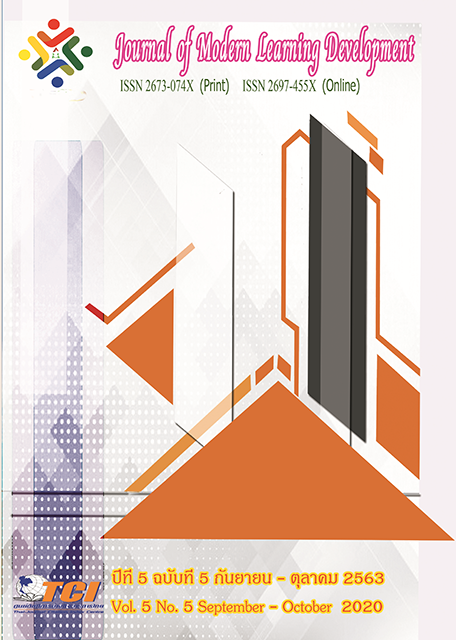The Promotion of Elderly Well-Being in Accordance with the Principles of Ovāda-Pāṭimokkha in the Elderly School of Mueang Kalasin Municipality, Kalasin Province
Main Article Content
Abstract
The objectives of this research were: to study the concepts of Buddhist well-being promotion; to study the health problems of the elderly in the Elderly School of Mueang Kalasin Municipality, Kalasin province; to study the promotion of the elderly well-being in accordance with the principles of Ovāda Pāṭimokkha (the Three Admonitions) in the above mentioned elderly school. This study was carried out by means of the qualitative research method through studying the related documents and in-depth interview. Its findings are presented based on the descriptive analysis.
The research results were as follows: The Buddhist well-being promotion is based in the principle called ‘the Four Bhāvanā (Four Development)’: Kāya Bhāvanā (Physical Development), the well-being promotion in terms of society and environment; Sīla Bhāvanā (Moral Development), Citta Bhāvanā (Mental Development) and Paññā Bhāvanā (Intellectual Development). The elderly in Elderly School of Mueang Kalasin Municipality has four problems: physical problems caused by not knowing and understanding the correct physical health care; social and environmental problems, involved physical expression such as speaking that insults other people's decisions, mistreatment and environment with air and noise pollution; psychological problems such as thinking too much, feeling slight, inability to let go their thought and depression found in most elderly; intellectual problems such as incomprehension of the truth of life and inability to let things go.
The Elderly School of Mueang Kalasin Municipality has applied the principles of Ovāda Pāṭimokkha to promote the well-being in accordance with the principles of Buddhism in three parts: 1) principles of well-being promotion (not to do any evil, to do good deeds, to purify the mind); 2) ideal in well-being promotion (patience, nirvana, not to hurt and exploit others); 3) methods of well-being promotion (not to say bad words, not to hurt, follow the Pāṭimokkha, being economical, living in the quiet place and train the mind). This is the holistic process of well-being promotion in the Buddhist ways. All three related to the Four Bhāvanā. This leads the elderly to have well-being in four aspects and live peacefully.
Article Details
References
กระทรวงการพัฒนาสังคมและความมั่นคงของมนุษย์.(2561). รายงานสถานการณ์ทางสังคมและความมั่นคงของมนุษย์ รายไตรมาส, (มกราคม - มีนาคม), ปีที่ 1 ฉบับที่ 1 เดือนมีนาคม 2561. ออนไลน์. สืบค้นเมื่อ 15 มกราคม 2563. แหล่งที่มา : http://tpso4.m-society.go.th/index.php/th/tpso-news/2017-05-16-15-16-07/130-2561-5-1
บรรลุ ศิริพานิช. (2559). สถานการณ์ผู้สูงอายุไทยประจำปี 2559. กรุงเทพมหานคร: มูลนิธิสถาบันวิจัยและพัฒนาผู้สูงอายุไทย.
เยาวลักษณ์ วงษ์ประภารัตน์ และคณะ. (2557). รูปแบบการส่งเสริมสุขภาพผู้สูงอายุโดยกระบวนการมีส่วนร่วมของชุมชนบ้านสันทรายหลวง อำเภอสันทราย จังหวัดเชียงใหม่. รายงานการวิจัย. กรุงเทพมหานคร : สำนักงานกองทุนสนับสนุนการวิจัย.
วิราภรณ์ โพธิศิริ และคณะ. (2559). โครงการศึกษาต้นแบบของการบูรณาการระบบการดูแลผู้สูงอายุระยะยาวในกลุ่มผู้สูงอายุที่มีภาวะพึ่งพิง. รายงานการวิจัย. สำนักงานคณะกรรมการพัฒนาการเศรษฐกิจและสังคมแห่งชาติ : วิทยาลัยประชากรศาสตร์ จุฬาลงกรณ์มหาวิทยาลัย.


